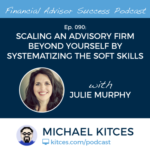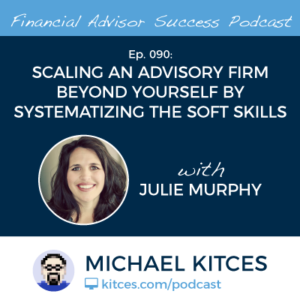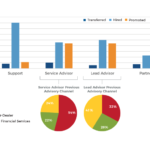Enjoy the current installment of "weekend reading for financial planners" – this week's edition kicks off with the industry buzz that TD Ameritrade is increasing the AUM threshold of its AdvisorDirect referral program to affiliated RIAs from a $500,000 minimum to $750,000 instead, while also more fully aligning its branch representative compensation above the threshold to compensate brokers equally for referring to TDA's in-house managed accounts or RIAs in AdvisorDirect, as yet another example of how RIA custodians with a retail presence are moving more and more into the mass affluent space themselves while segmenting off only their most affluent customers to affiliated RIAs... a potential boon to "up-market" independent RIAs that can receive such referrals, but a rising competitive threat and channel conflict for the remaining RIAs that are aiming to serve the mass affluent clientele that retail brokerage firms are increasingly trying to serve themselves with their own managed accounts.
From there, we have several insurance-related articles this week, from a look at how the most comprehensive Medigap supplemental Plan F policies will soon be going away (for new enrollees after 2019) but how the cost savings of almost-similar Medigap Plan G may be more appealing anyway, to the major shift of John Hancock to only sell "interactive" life insurance going forward that will give policyowners the opportunity to obtain premium discounts or other incentives to wear fitness tracking devices (e.g., a Fitbit or Apple Watch) and actually demonstrate they're adopting healthy exercise and lifestyle habits, a look at how popular universal life policies from 30+ years ago are "suddenly" starting to blow up for retirees in their 70s, 80s, and 90s due to the multi-decade decline in interest rates, and an overview of how hybrid long-term care insurance policies are increasingly replacing the use of traditional LTC insurance... but only for the most affluent clients.
We also have a few investment-related articles, including: an overview of the world of cryptocurrencies and blockchain as they relate to financial advisors; a look at whether consumer adoption of ESG investing is really sluggish, or if advisors are just failing to communicate the opportunity to clients to draw in their interest; a fascinating discussion about what really matters most (and what doesn't) when it comes to generating long-term investment results; and an evaluation of why individual bonds may not really be any better (and could be worse) than just owning bond funds in the face of a potential rising rate environment.
We wrap up with three interesting articles, all around the theme of how hard it is to change someone's mind (whether it's about politics, or how they spend their money): the first looks at how getting people to change their minds on major issues requires them to not only understand new facts and information, but also change their "tribe" and personal identity (such that if we have to change our mind at the cost of our social ties, we'll often choose factually incorrect information over "loneliness"); the second explores how the best way to win a divisive argument is not to try to prevail on facts and persuasiveness alone but to connect your points to the other person's frame of reference (which, notably, requires having some empathy for them to better understand their situation in the first place); and the last examines a recent study finding that people are much more likely to change their minds and take in new information when it is presented visually as a chart or graphic than just text... ostensibly because it's a lot easier to simply ignore text but incredibly difficult to forget a memorable image once it's seared into our minds?! All of which is again relevant not just in the era of polarized modern politics, but simply getting clients to change their point of view and adopt better money habits, too!
Enjoy the "light" reading!







 Welcome back to the 90th episode of the Financial Advisor Success podcast!
Welcome back to the 90th episode of the Financial Advisor Success podcast!

